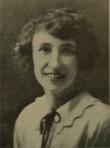Doris Louise Waraker was the only daughter of Ernest M. Waraker, at one time the Deputy Surveyor of Queensland. She had two brothers and attended the Brisbane Grammar School. One of the school's major annual poetry prizes is the Doris Waraker (Townsend) prize, a bursary awarded for a folio of original verse by a student.
In an interview with Bernice May, Waraker revealed that she began writing while she was at school. There were no other writers in her family, but she paid tribute to her mother, who she said always helped and encouraged her. Obsessed with sport, she wrote verses about her school tennis teams and the football and cricket teams to which her brothers belonged.
After her father's death in 1916 Waraker worked in a bank until the end of World War I, at the same time contributing written pieces to newspapers. Both of her brothers had signed up and one was killed in France in 1917. While Waraker was not a war poet, the war deeply affected her and May says of her that she wrote 'some of the most poignant verse influenced by that sorrow'.
The Australasian encouraged and supported Waraker's writing from the start and eventually she was contributing articles, short stories and poetry to a wide range of publications, including The Daily Telegraph, The Sydney Morning Herald, The Daily Mail, Smith's Weekly, Woman's World, The Bulletin and The Australian Woman's Mirror. She often relieved the editors of women's pages, sometimes for months at a time. Waraker stated she even enjoyed writing the social pages, but the one assignment she avoided was interviewing celebrities. She wrote several plays and was the drama critic for The Brisbane Telegraph until 1935 and again in the 1950s. She also freelanced for a number of papers and sometimes at the theatre would be asked who she was that night: The Courier, The Telegraph, or The Daily Mail.
On 13 December, 1926 Waraker married William Lewis Charles Townsend. The marriage did not last and Townsend married again in 1933. She appears not to have ever written under her married name.
Waraker won awards in two literary competitions. May described her as a lyric poet and one of the 'most natural' Australian writers. Hadgraft said of her that she was a poet to whom 'nature is a source of truth', as well as an 'acute and responsive' film and drama critic. Waraker herself stated that she enjoyed any kind of writing, but that her poetry was 'the best loved of my mind babies'.
 3596756319361378779.jpg
3596756319361378779.jpg
